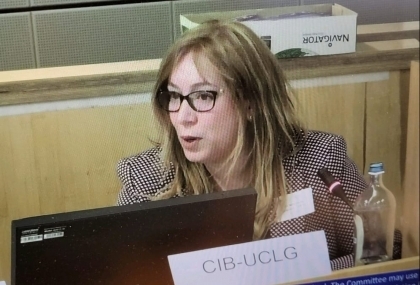
At the 6th OECD Roundtable on Cities and Regions for the SDGs at the European Committee of Regions (CoR) in Brussels, UCLG-CIB chair Dr. Neila Akrimi part took in a panel discussion om behalf of UCLG-CIB, to among others discuss how city-to-city partnerships and decentralised development cooperation can play a crucial role in advancing the SDGs as well as in addressing global megatrends, the aftermath of the COVID-19 pandemic and other shocks. The Roundtable brought together key stakeholders from cities, regions, national governments, the private sector, civil society, academia, philanthropy and international organizations. Dr. Neila Akrimi addressed the audience and spoke about the importance to jointly advocate for development cooperation by and for local governments, in different arenas, and to collectively take action.
"More important than knowledge exchange on decentralised development cooperation principles and values of solidarity, reciprocity and mutual learning and empowering, we need to develop a common understanding on the 'how' question - how do we implement effective actions, jointly?
Pressing global challenges and only 6 years left to report effectively on SDGs is making us face our collective responsibility and effectively engage from policy to action through impact sustainable partnerships in a workable "modus operandi". This is our real legacy for future generations. Local governments and their associations are simply one of the most important players to humanise international cooperation and forge this legacy!"
Furthermore, the event presented itself as the perfect occasion for the launch of three OECD reports.
- Decentralised Development Co-operation: A Global Policy Toolkit and Guidance for Practitioners – The Global policy toolkit: Guidance for practitioners shows how DDC can promote mutual benefits and peer-to-peer learning, bring development co-operation closer to people and their daily lives, and deliver technical services and expertise. By providing a repository of good practices and guidance on implementation modalities, the toolkit seeks to promote policy dialogue and mutual learning across DDC actors and to enhance DDC effectiveness, efficiency and impact worldwide.
- City-to-city partnerships to localise the Sustainable Development Goals – This report examines the conditions necessary for effective city-to-city partnerships and evaluates existing monitoring and evaluation mechanisms. It proposes a comprehensive framework for monitoring and evaluating city-to-city partnerships, combining self-assessment and SDG indicators to localize the Sustainable Development Goals (SDGs). The framework aims to address the lack of progress measurement and compliance with the G20 Rome High-Level Principles on city-to-city partnerships. The report shares insights from a pilot test of the framework, emphasizes policy implications, and suggests ways to enhance sustainability, transparency, and accountability in city-to-city partnerships, involving multiple levels of government and stakeholders.
- Reshaping Decentralised Development Co-operation in Germany – This report presents key data on the DDC landscape in Germany and offers guidance on how to strengthen its role in enabling peer-to-peer learning and improve collaboration between German states and municipalities. It also showcases how to further raise awareness about the mutual benefits of DDC partnerships, including through better ODA data reporting and a harmonised approach to monitoring and evaluating its results across levels of government.
